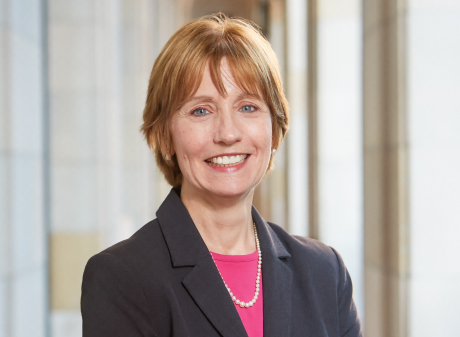In the Trenches during the 2007-09 Financial Crisis

Beverly Hirtle, executive vice president and director of research at the New York Fed.
Based in the financial capital of the world, the New York Fed has a front row seat to Wall Street. Beverly J. Hirtle, executive vice president at the Federal Reserve Bank of New York, was there during the 2007-09 financial crisis, while the Fed dealt with the growing crisis.
As an economist focused on banking supervision, she worked on a wide range of issues.
“But the thing that stands out most to me is the work that I did starting in late 2008 and into 2009 on the first Federal Reserve stress test, the SCAP or Supervisory Capital Assessment Program, where I was one of the people who was helping to design and implement that program,” she said. “And I served, along with a lot of other people, on the oversight committee that directed that program.”
In a Women in Economics Podcast Series episode, Hirtle discussed her journey in economics, the pandemic’s impact on research at the NY Fed, and the challenges in diversifying the profession. (The episode includes a transcript of the interview.)
After getting her doctorate in economics from MIT, Hirtle came to the NY Fed and never left. She is now head of its Research and Statistics group and its director of research. The NY Fed’s public service mission keeps her there.
Interestingly, years before the financial crisis, Hirtle and some other economists were already exploring how certain losses could affect the capital of banks; she built something that she now describes as a “toy tabletop stress test program.”
Though her early program wasn’t used to create this eventual stress test, some of the ideas that she developed with her colleagues did help set her up for the actual stress testing in 2009, Hirtle said.
This interconnection between research and policy is one aspect that interests her.
“Sometimes your research and the knowledge that you have, the expertise that you develop through your research is useful to be applied to the policy questions. And sometimes the policy questions really guide you to the interesting research questions,” she said.
Additional Resources
- Women in Economics: Beverly Hirtle
- On the Economy: Researching the International Economics of Immigration
- On the Economy: Studying How Work, Leisure and Home Influence Each Other
Citation
ldquoIn the Trenches during the 2007-09 Financial Crisis,rdquo St. Louis Fed On the Economy, Aug. 30, 2021.
This blog offers commentary, analysis and data from our economists and experts. Views expressed are not necessarily those of the St. Louis Fed or Federal Reserve System.
Email Us
All other blog-related questions

